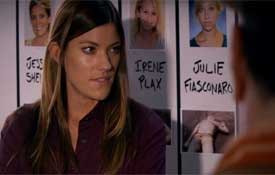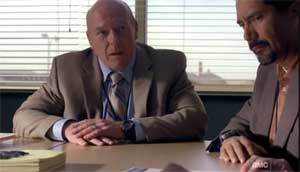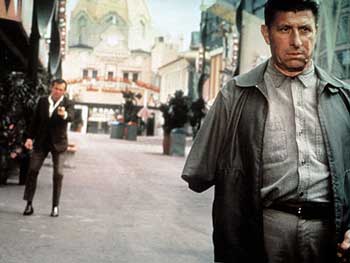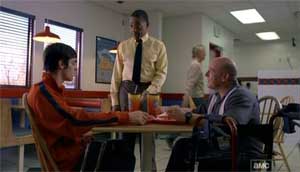
[MONDAY UPDATE: Today on NPR's Fresh Air with Terry Gross, I discuss what happened on the season finale of Breaking Bad.And yes, I note specifics. If you don't want to hear or read them, don't click HERE.- DB]
The second episode of Season 6 of Showtime's Dexter was televised Sunday night at 9 ET. An hour later, on AMC, Breaking Bad concluded Season 4. And so far as I'm concerned, the two outstanding, unusual drama series share more than an evening's proximity. When they do finally wrap up their daringly dark story lines, I predict they'll end the same way.
They'll end, I suspect, with loving relatives learning about their misdeeds, and squaring off against them in a raw, potentially fatal confrontation, fueled by disbelief, anger and betrayal...

In the case of Dexter, there are plenty of people who have been on the trail of serial killer Dexter Morgan (Michael C. Hall), who hides in plain sight as the blood spatter expert of the Miami Police Department. No one, though, has been closer to the truth, time and time again, than Dexter's own adoptive sister, Debra (Jennifer Carpenter), who nearly came around the corner to discover Dexter at a murder scene last season -- and, in previous seasons, has followed leads tenaciously enough to crack cases long before her fellow investigators.
On Breaking Bad, though meth chemist Walter White (Bryan Cranston), like former high-school science student Jesse (Aaron Paul), now has blood on his hands as a cold-blooded murderer, their biggest dangers right now come not from law enforcement, but from bosses and rivals.
But watch closely whenever Walter's brother-in-law Hank (Dean Norris), a DEA agent, is on the scene, and you'll see a man possessed. He wasn't always this way. Hank, whose proximity to and investigations into Walter's illegal activities (without knowing Walter was the meth manufacturer he was after) had gotten him hospitalized and nearly paralyzed, thought he had solved the case -- until Walter's drunken, ego-driven outburst at a family dinner party persuaded Hank that the real brains behind the operation was still at large.

So Hank, invigorated, stepped up both his physical rehab and his dogged investigation -- and, like Debra on Dexter, Hank's instincts are so sharp, and his pursuit so dogged, that he always seems to be barking up the right tree. A few weeks ago, he laid out his theories to his bosses, who dismissed them, and Hank -- but Hank hasn't given up. To use another dog analogy, he's got hold of a bone, and he won't let go.
Both of these shows are built on the same basic dynamic -- a familiar story with a familial twist, and with a compete flip-flop of the central morality. The story is Les Miserables, written by Victor Hugo in 1862, but still resonant and flexible to TV writers a century and more later.
In Les Miserables, the hero, Jean Valjean, performed a criminal act -- stole a loaf of bread -- but only to feed his family, after enduring a long series of hardships and injustices of his own. He was pursued, before and after his initial incarceration, by a relentless detective, Inspector Javert.
Television first adapted the Hugo story, brilliantly, in The Fugitive, which ran on ABC (and, in this case, that "ran" is literal) from 1963-67. David Janssen starred as Dr. Richard Kimble, accused of murdering his wife, and chased relentlessly by Lieutenant Philip Gerard (Barry Morse). Kimble insisted the real killer was a one-armed man, and spent years pursuing him just as he, in turn, was pursued by Gerard.

In the final episode, shown in the summer of 1967, Kimble and the one-armed man -- who, on this occasion, was armed with a revolver as well -- confronted one another atop a water tower. Gerard, from ground level, believed Kimble at last, and saved him by aiming a rifle at the one-armed man and shooting him just as he was about to shoot Kimble. The one-armed man fell to his death, Kimble was exonerated --and that episode of The Fugitive stood for decades as the most-viewed episode of a drama series in TV history.
But times have changed.
Kimble, even more so than Jean Valjean, was innocent. Fast-foward almost 50 years, and our TV protagonists are a lot murkier.
Walter White, on Breaking Bad, began innocently enough, but has piled on sin after sin as the series has progressed. Next year, Season 5, has been announced as its last, so series creator Vince Gilligan and his team already are focused on the end game.
Meanwhile, on Dexter, they're already into Season 6, and Dexter was a serial killer when we first met him. If anything, he's gained a soul of sorts as he's become a husband (briefly) and a father (still, and dotingly) -- but both these characters, while appearing mild-mannered and law-abiding, are doing wrong. Getting away with murder.
Breaking bad.
Take away your emotional investment in the central character, and the true heroes of these respective shows become clear. It's not the Jean Valjeans, it's the Inspector Javerts.
On Dexter, Debra even has just been promoted to lieutenant, giving her the same rank as the cop who pursued, and eventually found and set free, his quarry on The Fugitive. I firmly believe that Dexter will end with Debra confronting her beloved sibling -- a blood brother in one sense, though not biologically -- with full knowledge of his crimes.
The question is, what would she do next? Follow the law, or her heart? Since she's already let one killer go, when she intentionally let former torture victim Lumen slip away, could she turn the other way again?

And on Breaking Bad, if Hank finally learns the truth about his brother-in-law -- and let's just say when instead of if, because that eventuality seems, at this point, unavoidable -- what will HIS reaction be? Hank seems more the type of guy to side with the letter of the law, which means he may, after many long and vey tough years, finally get his man.
But then what? One of my TVWW colleagues, Eric Gould, has theorized that, in the end, Walter White will avoid one death sentence by beating cancer, but be done in by another by being convicted of murder and put to death by the state. I love that idea -- it's beautifully circular, even poetic -- but I trust the show's adherence to dramatic credibility. New Mexico abolished the death penalty in 2009, so if Walter is to die in next year's finale, it should be by some less institutionalized method.
In both Breaking Bad and Dexter, I'm betting the end game, with those shows' central characters, will involve the people who have been chasing them all along. That's easy to predict.
Who's left standing, at the final credits -- that's a lot tougher.